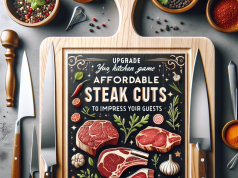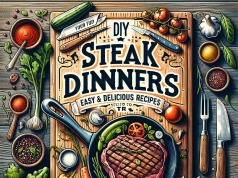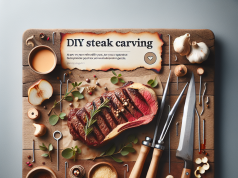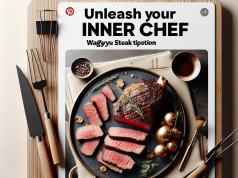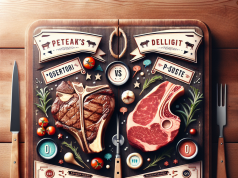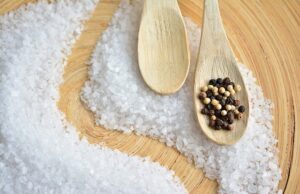Contents
The Ultimate Guide to Cooking Perfect Bavette Steak at Home
Are you tired of mediocre steaks that don’t quite hit the mark? Look no further! With our guide, you’ll be able to master the art of cooking a delicious bavette steak right in the comfort of your own home.
First and foremost, it’s important to choose the right cut of meat for your bavette steak. Look for a well-marbled piece that is around one inch thick. This will ensure that your steak comes out juicy and tender.
Next, season your steak with coarse sea salt and freshly ground black pepper. For an extra kick of flavor, consider adding some garlic powder or herbs like thyme or rosemary.
Heat up your pan to high and add some oil to prevent the steak from sticking. Sear the bavette steak for around 3-4 minutes on each side, until it turns a beautiful golden brown color.
Once your steak is seared, lower the heat to medium and continue cooking until it reaches your desired level of doneness. Keep in mind that bavette steak is best served medium-rare, so be careful not to overcook it!
Let your steak rest for a few minutes before slicing it against the grain. This will ensure that the meat stays juicy and tender.
With these simple steps, you’ll be able to cook the perfect bavette steak every time. Impress your friends and family with your newfound culinary skills and enjoy a delicious meal in the process!
🔥Premium Angus Beef T-Bone – SHOP NOW🔥
Introduction
Welcome to the ultimate guide to cooking perfect bavette steak at home. Bavette steak, also known as flap steak or sirloin tip, is a versatile and delicious cut of beef that is perfect for a special occasion or a weeknight dinner. In this post, you’ll learn everything you need to know to cook a delicious bavette steak that will wow your friends and family.
What is Bavette Steak?
Bavette steak is a cut of beef that comes from the bottom sirloin. It’s a long, flat steak that is also known as flap meat or sirloin tip. Bavette steak is a lean and flavorful cut of beef that is perfect for grilling, broiling, or pan-searing.
How to Choose the Perfect Bavette Steak
When choosing a bavette steak, look for a cut that is bright red and has a consistent marbling of fat. The fat should be creamy white and evenly distributed throughout the meat. Avoid any bavette steaks that have a grayish color or excessive amounts of fat.
Seasoning Your Bavette Steak
Before cooking your bavette steak, it’s important to season it properly. A simple blend of salt and pepper is all you need to bring out the natural flavors of the beef. For an extra kick of flavor, you can also add garlic powder, onion powder, or your favorite steak seasoning blend.
Cooking Methods for Bavette Steak
There are several ways to cook bavette steak, including grilling, broiling, and pan-searing. Each method has its own advantages and disadvantages. The best method for you will depend on your personal preferences and the equipment you have available.
Grilling Bavette Steak
To grill bavette steak, preheat your grill to high heat. Oil the grates and place the steak on the grill. Cook for 3-4 minutes per side for a medium-rare steak. Remove from the grill and let it rest for 5-10 minutes before slicing and serving.
Broiling Bavette Steak
To broil bavette steak, preheat your broiler to high heat. Place the steak on a broiler pan and place it under the broiler. Cook for 3-4 minutes per side for a medium-rare steak. Remove from the broiler and let it rest for 5-10 minutes before slicing and serving.
Pan-Searing Bavette Steak
To pan-sear bavette steak, heat a cast-iron skillet over high heat. Add oil to the skillet and place the steak in the pan. Cook for 3-4 minutes per side for a medium-rare steak. Remove from the skillet and let it rest for 5-10 minutes before slicing and serving.
Serving Suggestions
Bavette steak pairs well with a variety of side dishes, including roasted vegetables, mashed potatoes, and salad. You can also top it with a flavorful sauce, such as chimichurri, salsa verde, or garlic butter.
Conclusion
Cooking the perfect bavette steak at home is easy when you follow these simple tips and techniques. Whether you choose to grill, broil, or pan-sear your steak, the key is to choose a high-quality cut of beef, season it properly, and let it rest before slicing and serving. With this guide, you’ll be able to impress your friends and family with a delicious and tender bavette steak that they won’t soon forget.
For more tips and recipes for cooking beef, check out our beef recipes page.
Relevant keywords: bavette steak, flap steak, sirloin tip, cut of beef, grilling, broiling, pan-searing, seasoning, serving suggestions, chimichurri, salsa verde, garlic butter.
FAQs: The Ultimate Guide to Cooking Perfect Bavette Steak at Home
1. What is Bavette Steak?
Bavette Steak, also known as Flap Steak, is a long and flat cut of beef that comes from the lower belly of the cow.
2. How should I season my Bavette Steak?
Season your Bavette steak with coarse sea salt, freshly ground black pepper, and any other herbs or spices you prefer. For best results, season the steak at least an hour before cooking to allow the flavors to penetrate the meat.
3. How do I cook Bavette Steak?
The best way to cook a Bavette steak at home is by using a grill or a cast-iron skillet. Heat the skillet over high heat and add a little oil to the pan. Once the pan is hot, add the steak and cook for 3-4 minutes on each side for medium-rare or until cooked to your desired level of doneness.
4. How do I know when my Bavette steak is done?
You can check the doneness of your Bavette steak by using a meat thermometer. For medium-rare, the internal temperature of the steak should be around 130°F. For medium, it should be around 135°F, and for well-done, it should be around 145°F.
5. Should I let my Bavette steak rest after cooking?
Yes, it is essential to let your Bavette steak rest for a few minutes after cooking. This allows the juices to redistribute, resulting in a more tender and flavorful steak.
Bavette Steak Cut: A Meat Lover’s Delight
What is Bavette Steak?
Bavette steak is a long, flat, and flavorful cut that comes from the lower belly of the cow. It’s also known as flank steak or flap steak and is popular in French cuisine.
How to Cook Bavette Steak?
Bavette steak is best when cooked quickly over high heat. It’s recommended to marinate the steak for a few hours before grilling or broiling to enhance the flavor. When cooking, be sure to let the steak rest for a few minutes after taking it off the heat to allow the juices to redistribute.
Why Choose Bavette Steak?
Bavette steak is a lean protein that’s packed with flavor. It’s also an affordable cut of beef that’s perfect for budget-friendly meals. With its versatility, Bavette steak can be used in a variety of dishes such as stir-fries, kebabs, sandwiches, and of course, steak frites!
If you want to learn more about bavette steak and its versatility in cooking, check out Wikipedia’s page on it.
Premium Angus Beef T-Bone – SHOP NOW
Introduction
- What is Bavette steak?
- Why cook Bavette steak at home?
Choosing the Right Bavette Steak
- Prime grade vs choice grade
- Thickness of the steak
- Marbling
Preparing the Bavette Steak
- Bringing the steak to room temperature
- Seasoning the steak
- Preheating the pan or grill
Cooking the Bavette Steak
- Grilling
- Pan-searing
- Broiling
Serving the Bavette Steak
- Resting the steak
- Slicing the steak
- Serving suggestions
Troubleshooting Common Problems
- Overcooking the steak
- Undercooking the steak
- Uneven cooking
Conclusion
- Recap of tips and tricks
- Final thoughts on cooking Bavette steak at home
Category – STEAKS, BURGER & MEATS






























